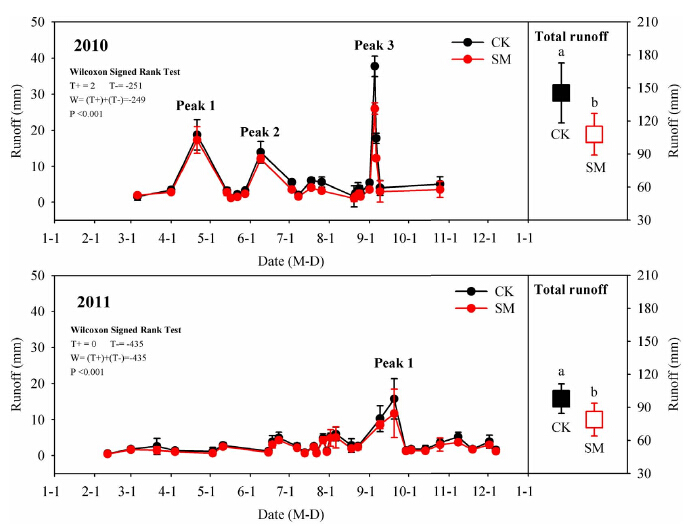Name:CHEN Fang
Tell:
Email:fchenipni@126.com
Organization:Wuhan Botanical Garden
Straw Mulching Reduces Harmful Effects of Extreme Hydrological and Temperature Conditions to Improve Citrus Yield
2015-01-07
Extreme weather events cause negative effects and even fatal damages to crops. Some farmland management practices could bring certain positive effects against these extreme weather events, such as field microclimate, beneficial soil water and thermal conditions.
Thanks to the beneficial hydrothermal conditions, the yields of citrus in the Danjiangkou Reservoir Area are approximately 40 t hm-2 in average. However, the yields are always strongly affected by cold and drought stresses. In recent decades, local farmers have been using wheat (or rice) straw for soil mulching (SM) in citrus orchards, which could effectively contribute to soil & water conservation and nutrients loss mitigation. To date, little is known about the impact of SM practices on citrus production under extreme climate conditions.
Dr. LIU Yi, supervised by Prof. CHEN Fang from Wuhan Botanical Garden, compared the runoff, soil water content and storage, and seasonal variations of soil temperature under SM and non- mulching or control (CK) treatment during 2010 and 2011 in the Danjiangkou reservoir area. The two-year field experiment was conducted to test the hypothesis that SM practices can greatly impact citrus fruit yields in extreme weather conditions by affecting soil water conservation and thermoregulation.
Wilcoxon signed rank test (WSRT) result (P﹤0.05) revealed that the annual total runoff in the SM plots was greatly reduced compared with CK, which correspondently improved soil water status in the root zone. The seasonal variations in water storage in the soil profile (0-100 cm) showed that SM treatment increased soil water storage as compared to CK, especially during dry periods (from January to March).
Seasonal variations and monthly mean soil temperatures under CK and SM treatments demonstrated that soil temperatures under SM plots were higher during cold seasons and lower during warmer seasons. The underlying mechanisms were that: the mulch acted as an insulator which reduced soil radiation absorption during the warmer period and helped to retain soil heat during the colder period, resulting in smaller fluctuation in soil temperatures, so as to improve crop yield and soil water utilization.
Significant difference in citrus yields between CK and SM appeared in 2011 when extreme cold conditions happened during the overwinter stage. The citrus fruit was completely destroyed (zero fruit yield) in the CK plots, whereas, its yields were guaranteed despite some loss in the SM plots.
All the results suggested that SM is also an effective way to improve citrus fruit yield by affecting soil water and temperature, especially in extreme weather conditions.
This work was financially supported by the National Key Technology R&D Program, the NSFC, the Open Funding Project of the Key Laboratory of Aquatic Botany and Watershed Ecology, Chinese Academy of Sciences and the Cooperated Program with the International Plant Nutrition Institute. Research entitled “Straw Mulching Reduces the Harmful Effects of Extreme Hydrological and Temperature Conditions in Citrus Orchards” was published in PLOS One.

Seasonal variation in and annual total runoff under control (CK) and straw mulching (SM) treatments during 2010 and 2011 (Image by LIU Yi)